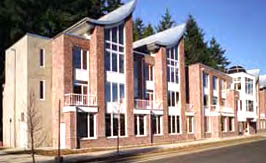
Consider the alternatives. The C.K. Choi building at the University of British Columbia (above) is a model of innovative design that enhances both energy efficiency and human health and productivity. The 30,000-square-foot office building, which provides work space for 300 people, has no connection to a sewer system. It uses composting toilets and waterless urinals installed and maintained by Clivus Multrum, Inc., of Massachusetts.
The toilets connect directly with the composting container in the basement by way of a stainless steel chute. A ventilation system continuously pulls air down through the fixtures, eliminating any odor. The waste material is treated with a small amount of water and bulking material such as pine shavings, while bacteria and fungi do most of the composting work. The material is reduced in volume by 90 percent and resembles topsoil when the process is completed. The result is a nutrient-rich fertilizer that would be a costly additive if purchased from a retailer.
Water from sinks and other systems is directed to a greywater system where it is filtered and used to irrigate plants around the building. More water for landscape irrigation is provided by a 7,000-gallon tank that collects rainwater.
The Choi building uses just 132 gallons of water a day compared to a conventional building of the same size that uses an average of 1,850 gallons a day. Maintenance on the composting system costs no more than a building with flushing toilets.
Clivus Multrum, Inc., has been manufacturing composting and greywater systems for 30 years. They are currently used in commercial buildings and homes, as well as at rest stops and golf courses. The C.K. Choi building shows that modern buildings can save valuable fresh water and function quite well without a connection to a municipal sewage system.
For more information visit www.clivus.com


